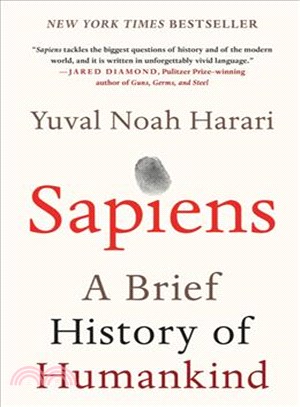目前查詢
歷史查詢

Sapiens :a brief history of humankind /
作者 : Harari, Yuval N.,,author.
出版社 : Harper,
出版年 : 2015
ISBN:0062316117|9780062316097|9780062316110
- 館藏(3)
- 書目資訊
- 心得(0)
- 機讀格式
- 標籤
書名 : Sapiens :a brief history of humankind /
紀錄類型 : 書目-語言資料,印刷品: 單行本
正題名[資料類型標示]/作者 : Sapiens :Yuval Noah Harari ; translated by the author, with the help of John Purcell and Haim Watzman ; maps by Neil Gower.
其他題名 : a brief history of humankind /
作者 : Harari, Yuval N.,
版本項 : 1st U.S. ed.
出版者 : New York, NY :Harper,[2015]
面頁冊數 : [viii], 443 p. :ill. (chiefly col.), col. maps ;24 cm.
附註 : Translation of: Kitsur toldot ha-enoshut. 2011.
內容註 : Timeline of history -- Part One. The cognitive revolution -- An animal of no significance -- The tree of knowledge - - A day in the life of Adam and Eve -- The flood -- Part Two. The agricultural revolution. History's biggest fraud -- Building pyramids -- Memory overload -- There is no justice in history -- Part Three. The unification of humankind. The arrow of history -- The scent of money -- Imperial visions -- The law of religion -- The secret of success -- Part Four. The scientific revolution. The discovery of ignorance -- The marriage of science and empire -- The capitalist creed -- The wheels of industry - - A permanent revolution -- And they lived happily ever after -- The end of Homo sapiens -- Afterword: The animal that became a god.
標題 : Technology and civilization
ISBN : 9780062316097 (hbk.) :
LEADER 03036cam a2200337 a 4500
001 367534
003 TNML
005 20171107182652.0
008 180321r20152011nyub e 000 0 eng d
010 $a2014028418
020 $a9780062316097 (hbk.) :$cNT$1064
020 $a9780062316110 (pbk.) :$cNT727
020 $a0062316117 (pbk.) :$cNT727
035 $aNO000181013
035 $aNO000129874
037 $b公共圖書館臺南分區資源中心
040 $aDLC$beng$cDLC$dIG$dUPZ$dYDXCP$dBDX$dGK8$dJAI$dZHB$dBKL$dILC$dJQM$dUOK$dYAM$dAZT$dDAC$dOCLCF$dDAD$dNDS$dYBM$dTAE$dTWTNM
041 1 $aeng$hheb
050 00$aCB113.H4$bH3713 2015
082 04$a599.9$222
090 $a臺南市立圖書館
100 1 $aHarari, Yuval N.,$eauthor.
245 10$aSapiens :$ba brief history of humankind /$cYuval Noah Harari ; translated by the author, with the help of John Purcell and Haim Watzman ; maps by Neil Gower.
250 $a1st U.S. ed.
260 $aNew York, NY :$bHarper,$c[2015]
300 $a[viii], 443 p. :$bill. (chiefly col.), col. maps ;$c24 cm.
500 $aTranslation of: Kitsur toldot ha-enoshut. 2011.
500 $aFirst published in Hebrew in Israel in 2011 by Kinneret, Mora-Bitan, Dvir.--Title page verso.
500 $aPreviously published in a slightly different form in Great Britain in 2014 by Harvill Secker, a division of the Random House Group Ltd.--Title page verso.
504 $aIncludes bibliographical references (p. 417-428) and index.
505 0 $aTimeline of history -- Part One. The cognitive revolution -- An animal of no significance -- The tree of knowledge - - A day in the life of Adam and Eve -- The flood -- Part Two. The agricultural revolution. History's biggest fraud -- Building pyramids -- Memory overload -- There is no justice in history -- Part Three. The unification of humankind. The arrow of history -- The scent of money -- Imperial visions -- The law of religion -- The secret of success -- Part Four. The scientific revolution. The discovery of ignorance -- The marriage of science and empire -- The capitalist creed -- The wheels of industry - - A permanent revolution -- And they lived happily ever after -- The end of Homo sapiens -- Afterword: The animal that became a god.
520 $aOne hundred thousand years ago, at least six different species of humans inhabited Earth. Yet today there is only one -- homo sapiens. What happened to the others? And what may happen to us? From examining the role evolving humans have played in the global ecosystem to charting the rise of empires, Sapiens integrates history and science to reconsider accepted narratives, connect past developments with contemporary concerns, and examine specific events within the context of larger ideas. Dr. Harari also compels us to look ahead, because over the last few decades humans have begun to bend laws of natural selection that have governed life for the past four billion years. We are acquiring the ability to design not only the world around us, but also ourselves. Where is this leading us, and what do we want to become?.
650 0$aTechnology and civilization$xHistory.
650 0$aCognition and culture.
650 0$aChronology, Historical.
650 0$aCivilization$xHistory.
650 0$aHuman beings$xHistory.
650 0$aWorld history.
653 $a知識性
